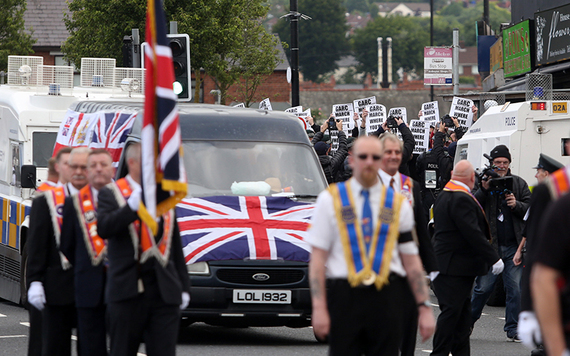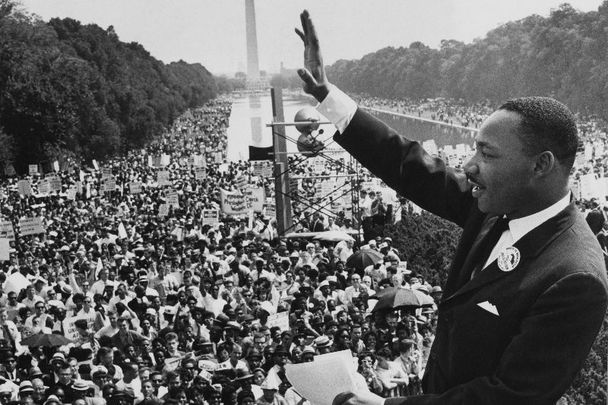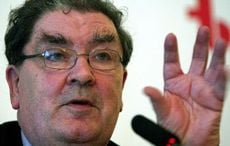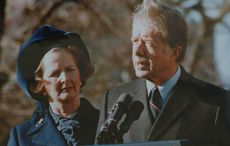In observance of Martin Luther King Jr. Day, a look at the American activist's legacy on the island of Ireland.
Martin Luther King’s legacy is intact as the greatest African American leader of all time, an orator to rival President Abraham Lincoln, and a reputation that matches Mahatma Gandhi around the globe.
His impact was global. It was certainly huge in Ireland. Indeed, we would never have seen the incredible changes in Northern Ireland and the push for equality were it not for the King legacy.
In his official Nobel Prize interview before accepting the award, John Hume stated, “Martin Luther King was very much our inspiration” when they had to address discrimination and prejudice in Northern Ireland.
Accepting the Martin Luther King Award at Ebeneezer Baptist Church in Atlanta, Georgia in January 1999, Hume said in part: "We did not seek to inflict suffering. We believed, in the words of Martin Luther King, in the redemptive quality of unearned suffering.
"We believed that we would accomplish more through suffering and
enduring for our own beliefs.
"We believed in inclusivity, not exclusivity.
"We believed in peace, in the ability of human beings to find their common
humanity.
"We believed that true unity among all Irish people, Protestant and Catholic,
nationalist and unionist, was a unity of the heart not merely of the soil."
King's widow, Coretta, praised Hume when she presented him with the award: "Like Dr. King, he has demonstrated the power of one person that provided a spark of leadership that provided a way out of no way."
MARTIN LUTHER KING DAY On Martin Luther King Day, let us remember the words of john Hume who stated, “Martin Luther...
Posted by John and Pat Hume Foundation on Monday, January 18, 2021
The lives of John Hume and Martin Luther King Jr. have often been compared
The comparisons were evident. As John Conroy remarked in "Belfast Diary," “Northern Catholics ... had a position in society equivalent to blacks in the United States at that time."
Brian Dooley, the author of "The Black and Green," an excellent account of the Irish/Black interaction, was in no doubt about King’s importance in the civil rights struggle in Northern Ireland; he was "an enormously powerful and symbolic figure ... for civil rights struggles in Northern Ireland... . "
As in the Deep South, the discrimination in Northern Ireland had been around for generations. The Northern discrimination by Protestants against Catholics is known as the policy of a Protestant state for a Protestant people, a motto for Northern Ireland coined by their Prime Minister right after partition in 1922. Pogroms drove hundreds of Catholics out of their homes as police stood by.

Love Irish history? Share your favorite stories with other history buffs in the IrishCentral History Facebook group.
Catholics were treated as second-class citizens in Northern Ireland
The nationalists were treated like peasants and serfs, confined to ghettos and lowlands while the unionists lorded it over them. The Irish nationalist party that sprung up was hopelessly ineffective and occasional IRA campaigns came to naught.
In 50 years, there had been one Catholic in government, and he was a castle Catholic – Catholic in name only.
Every year, hundreds of Orange marches paraded through Catholic neighborhoods, flaunting their superiority and making sure that the “croppies lie down” policy was left intact.

An Orange Order march.
The discrimination was especially blatant in three areas: gerrymandering of constituencies so that there was always a unionist majority, an incredible voting system that allowed multiple votes for rich landowners and businessmen – all Protestant of course – and vicious discrimination in housing.
Catholic housing was one of the major issues that sparked the Northern Ireland Civil Rights Movement
It was in housing that one of the first flashpoints occurred when Austin Currie, a nationalist politician, squatted in a house in Co Tyrone after it was refused to a large Catholic family desperately in need and given instead to a young, single Protestant woman. All 14 houses were given to Protestants on the estate.
When the first stirrings of the civil rights movement began in Ireland, it was Martin Luther King’s name and tactics that were on everybody’s lips.
October 5, 1968, is generally accepted as the birth of the civil rights movement. On that day, inspired by Dr. King, a group of activists marched into Derry city center demanding an end to discrimination.
The Royal Ulster Constabulary (RUC), in full view of the cameras, attacked the crowd of marchers as viciously as any southern American sheriff attacked King’s followers.
The marchers were trapped between two lines of advancing RUC thugs and it was good fortune that nobody was killed as the police rained down blow after blow with batons.
The Long March and the Battle of the Bogside were major events in the movement
The fuse was lit. In January 1969, the People’s Democracy, a university students' group, followed the path of non-violence and organized a "Long March" from Belfast to Derry modeled on King’s civil rights march to Montgomery, Alabama.
The march was attacked repeatedly along the way, but as it developed it drew more supporters and participants. By marching through "Protestant territory, where it was repeatedly blocked and threatened, the Long March exposed Northern Irish sectarianism and the unwillingness of police to defend the right to protest."
As they neared Derry, at Burntollet Bridge, the marchers were ambushed by loyalists and members of the RUC. Eighty-seven activists were hospitalized. When the marchers reached Derry, the city exploded in riots. Following a night of rioting, RUC men entered the Bogside (a Catholic ghetto), wrecked a number of houses and attacked innocent civilians
Northern Ireland's sectarian nature was revealed to the world.
In the latter part of 1969 came the Battle of the Bogside when an Orange march was attempting to strut through the heart of the Catholic neighborhood.
For five days, the clashes between police (trying to force the march through) and locals (trying to stop it) transfixed the world.
As Bernadette Devlin noted: “We reached then a turning point in Irish history, and we reached it because of the determination of one group of people in a Catholic slum area in Derry. In 50 hours we brought a government to its knees, and we gave back to a downtrodden people their pride and the strength of their convictions."
Without Martin Luther King's example, there is no question the Irish civil rights movement, modeled so closely on his thinking, would never have come together and Northern Ireland might well still be Britain's dirty little sectarian secret.
Incredibly, the Black preacher from Atlanta had reached halfway around the world and inspired a civil rights revolution in Ireland. On this day, we commemorate him. It is his Irish legacy of a long march to freedom that all Irish people should know.
* Originally published in 2017. Last updated in January 2025.




Comments